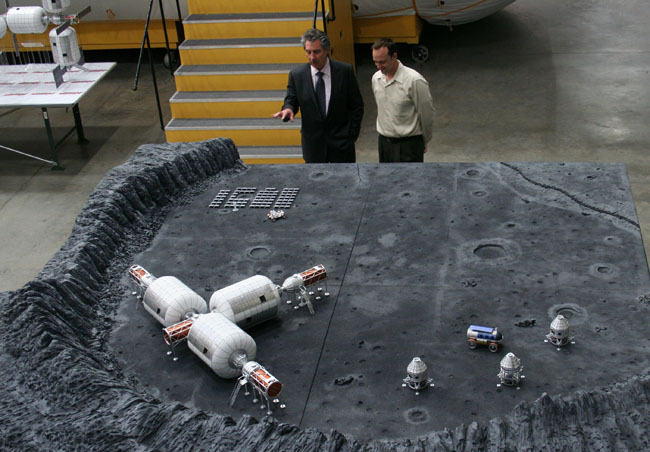China Will Own the Moon, Space Entrepreneur Worries

LAS CRUCES, N.M. — A new game of "Solar System Monopoly" is under way, and the United States is losing, commercial space entrepreneur Robert Bigelow said today (Oct. 19).
The first prize, ownership of the moon, is up for grabs, and China will likely snag it, Bigelow said here at the 2011 International Symposium for Personal and Commercial Spaceflight.
Bigelow's Las Vegas-based company, Bigelow Aerospace, is constructing private inflatable space modules that it hopes to rent out to government and commercial customers. The firm is even working on a series of labs for a human lunar colony.
But by the time the America gets into gear to build its own moon base, large swaths of lunar territory may already be claimed, Bigelow said in a talk that the firebrand entrepreneur warned the audience would be "controversial."
"Americans are still basking in the lunar glory from 40 years ago," Bigelow said. "But we don’t own one square foot of the damn place. NASA is a shadow of the space agency it once was in the 1960s and 1970s."
In contrast, he argued, China has the motivation and ability to win the next space race and claim ownership of much of the moon. Bigelow argued that international law would allow a nation to make such a claim, especially if it were able to enforce it through continuous human lunar presence. [Photos: China's First Space Station]
Owning the moon would be a windfall both financially and for international prestige, he said. Not only does it offer a jumping off point for further exploration of the solar system, but it also contains vast stores of valuable resources such as water and helium-3, a possible fuel for nuclear fusion.
Get the Space.com Newsletter
Breaking space news, the latest updates on rocket launches, skywatching events and more!
Moreover, the symbolic and global psychological impact would be huge, Bigelow said. "I think nothing else China could possibly do in the next 15 years would cause as great a benefit for China."
In addition to China's growing technological prowess, the country has the cash, the lack of debt and the national will to become the owner of the moon, Bigelow argued. He predicted China could claim ownership of vast swaths of lunar territory by 2022 to 2026.
"Hopefully this will produce the fear factor necessary to motivate the Americans," Bigelow said.
But while the U.S. could be losing the race to own the moon, Bigelow said that Mars offers another frontier up for grabs.
He advocated for putting 10 percent of the money the United States currently spends on the wars in Iraq and Afghanistan toward space exploration with the goal of establishing a presence on Mars.
"America would experience a rebirth of vision, excitement, science and global prestige," Bigelow said.
However, competition with China is not the only option, Bigelow said. If the Chinese would have us as collaborators in moon exploration, space cooperation with China would be a great idea. "A piece of something is better than a piece of nothing," Bigelow said.
You can follow SPACE.com senior writer Clara Moskowitz on Twitter @ClaraMoskowitz. Follow SPACE.com for the latest in space science and exploration news on Twitter @Spacedotcom and on Facebook.
Join our Space Forums to keep talking space on the latest missions, night sky and more! And if you have a news tip, correction or comment, let us know at: community@space.com.

Clara Moskowitz is a science and space writer who joined the Space.com team in 2008 and served as Assistant Managing Editor from 2011 to 2013. Clara has a bachelor's degree in astronomy and physics from Wesleyan University, and a graduate certificate in science writing from the University of California, Santa Cruz. She covers everything from astronomy to human spaceflight and once aced a NASTAR suborbital spaceflight training program for space missions. Clara is currently Associate Editor of Scientific American. To see her latest project is, follow Clara on Twitter.